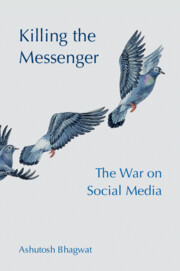Killing the Messenger
Killing the Messenger is a highly readable survey of the current political and legal wars over social media platforms. The book carefully parses attacks against social media coming from both the political left and right to demonstrate how most of these critiques are overblown or without empirical support. The work analyzes regulations directed at social media in the United States and European Union, including efforts to amend Section 230 of the Communications Decency Act. It argues that many of these proposals not only raise serious free-speech concerns but also likely have unintended and perverse public policy consequences. Killing the Messenger concludes by identifying specific regulations of social media that are justified by serious, demonstrated harms and that can be implemented without jeopardizing the profoundly democratizing impact social media platforms have had on public discourse. This title is also available as open access on Cambridge Core.
Ashutosh Bhagwat is a Distinguished Professor and the Boochever and Bird Endowed Chair at the University of California, Davis School of Law. Professor Bhagwat is the author of Our Democratic First Amendment (2020) and The Myth of Rights (2010). He is also a member of the American Law Institute.
